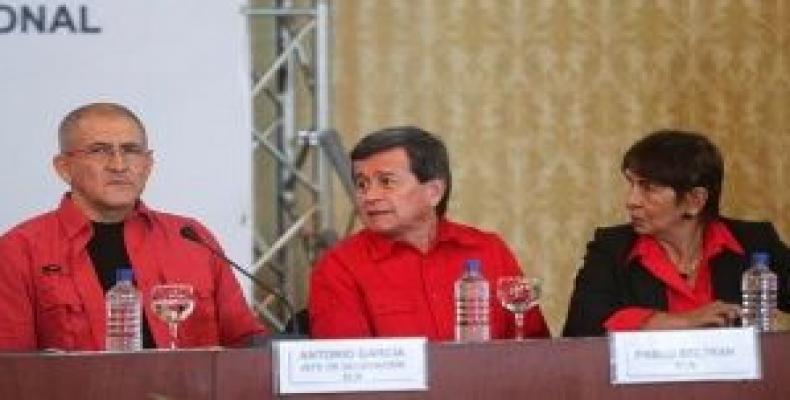Quito, January 16 (RHC)-- Colombia's second-largest rebel group began preliminary talks with the government over the weekend, hoping to agree on a lasting peace like the FARC. Colombia had its first working group meeting with the country's second-largest rebel group, the National Liberation Army, or ELN, to move forward with a peace process two years in the making.
"We hope to share good news on the dialogue with the government," announced members of the ELN delegation, referring to the beginning of the preliminary public peace talks in Ibarra, Ecuador.
The Colombian government had previously abruptly and unexpectedly canceled talks that were set to begin October 27 after President Juan Manuel Santos said the ELN failed to confirm the release of a detainee, former lawmaker Odin Sanchez.
The move revealed differing interpretations of preliminary agreements, as the ELN maintained it planned to release Sanchez once talks were underway and also asked the government to pardon two ELN prisoners in a show of reciprocity.
The government announced plans to move ahead with the talks despite the fact that Sanchez is still held hostage. The ELN has released proof that Sanchez is alive and well in the rebel army's camps.
Should the meeting go well, Santos said that official peace talks could begin between the government and the rebel forces. He also announced that the capture of ELN member and explosives expert Moises Valencia, known as Moisabomba, adding that the armed forces will continue with their operations against the ELN.
The ELN stressed that the rebel group would want to see a different process than the one carried out with the Revolutionary Armed Forces of Colombia, or FARC. The government and the FARC unveiled a final agreement at the end of August after nearly four years of dialogue in Havana, and later revised the deal after Colombian voters narrowly rejected it by less than half a percentage point in a plebiscite on October 2nd. Congress approved the updated agreement on Nov. 30, triggering the beginning of the implementation phase.
Founded in 1964, the ELN is smaller and less well-known than the FARC, which consolidated the same year in a different part of the country.
FARC leaders and many analysts have insisted that Colombia will only be capable of building stable and lasting peace if an end-of-conflict deal is also reached with the ELN. The ELN has commended the government and the FARC on the historic rapprochement, celebrating it as an important step toward peace, but also stressed that a peace process with its own ranks will be marked by key "sovereign" differences. In particular, ELN leaders have stressed the importance of the democratic participation of Colombian people, especially marginalized groups. Like the FARC, the ELN has attempted peace talks with past governments to no avail.
The talks will cover six major points, already agreed to in preliminary negotiations, which are: the participation of civil society in the peace-building process, democracy for peace, transformation for peace, victims, ending the conflict, and implementation of the agreements. The roadmap overlaps considerably with the cornerstones of the agreement between the government and the FARC, highlighting the root causes of inequality underlying the conflict.
Colombia’s five-decade armed conflict has claimed some 260,000 lives and displaced at least seven million people. Estimates suggest that right-wing paramilitaries are responsible for up to 80 percent of the violence and human rights abuses that took place during the 52 years of conflict.
Second Colombian Peace Talks Begin with ELN Opening Meeting in Ecuador


